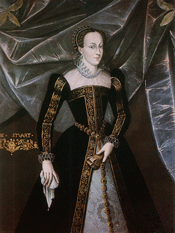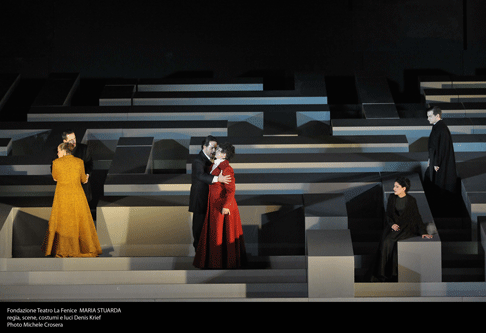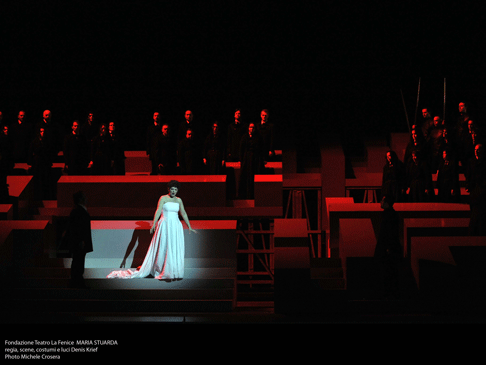
29 Apr 2009
Donizetti’s “Maria Stuarda” at La Fenice — Two Women in a Labyrinth
From the word “go”, the audience feels that this “Maria Stuarda” is quite different from the standard fare offered by Italian theatres.
English Touring Opera are delighted to announce a season of lyric monodramas to tour nationally from October to December. The season features music for solo singer and piano by Argento, Britten, Tippett and Shostakovich with a bold and inventive approach to making opera during social distancing.
This tenth of ten Live from London concerts was in fact a recorded live performance from California. It was no less enjoyable for that, and it was also uplifting to learn that this wasn’t in fact the ‘last’ LfL event that we will be able to enjoy, courtesy of VOCES8 and their fellow vocal ensembles (more below …).
Ever since Wigmore Hall announced their superb series of autumn concerts, all streamed live and available free of charge, I’d been looking forward to this song recital by Ian Bostridge and Imogen Cooper.
The Sixteen continues its exploration of Henry Purcell’s Welcome Songs for Charles II. As with Robert King’s pioneering Purcell series begun over thirty years ago for Hyperion, Harry Christophers is recording two Welcome Songs per disc.
Although Stile Antico’s programme article for their Live from London recital introduced their selection from the many treasures of the English Renaissance in the context of the theological debates and upheavals of the Tudor and Elizabethan years, their performance was more evocative of private chamber music than of public liturgy.
In February this year, Albanian soprano Ermonela Jaho made a highly lauded debut recital at Wigmore Hall - a concert which both celebrated Opera Rara’s 50th anniversary and honoured the career of the Italian soprano Rosina Storchio (1872-1945), the star of verismo who created the title roles in Leoncavallo’s La bohème and Zazà, Mascagni’s Lodoletta and Puccini’s Madama Butterfly.
Evidently, face masks don’t stifle appreciative “Bravo!”s. And, reducing audience numbers doesn’t lower the volume of such acclamations. For, the audience at Wigmore Hall gave soprano Elizabeth Llewellyn and pianist Simon Lepper a greatly deserved warm reception and hearty response following this lunchtime recital of late-Romantic song.
Collapsology. Or, perhaps we should use the French word ‘Collapsologie’ because this is a transdisciplinary idea pretty much advocated by a series of French theorists - and apparently, mostly French theorists. It in essence focuses on the imminent collapse of modern society and all its layers - a series of escalating crises on a global scale: environmental, economic, geopolitical, governmental; the list is extensive.
For this week’s Live from London vocal recital we moved from the home of VOCES8, St Anne and St Agnes in the City of London, to Kings Place, where The Sixteen - who have been associate artists at the venue for some time - presented a programme of music and words bound together by the theme of ‘reflection’.
'Such is your divine Disposation that both you excellently understand, and royally entertaine the Exercise of Musicke.’
Amongst an avalanche of new Mahler recordings appearing at the moment (Das Lied von der Erde seems to be the most favoured, with three) this 1991 Mahler Second from the 2nd Kassel MahlerFest is one of the more interesting releases.
‘And there was war in heaven: Michael and his angels fought against the dragon; and the dragon fought and his angels, And prevailed not; neither was their place found any more in heaven … that old serpent … Satan, which deceiveth the whole world: he was cast out into the earth, and his angels were cast out with him.’
If there is one myth, it seems believed by some people today, that probably needs shattering it is that post-war recordings or performances of Wagner operas were always of exceptional quality. This 1949 Hamburg Tristan und Isolde is one of those recordings - though quite who is to blame for its many problems takes quite some unearthing.
There was never any doubt that the fifth of the twelve Met Stars Live in Concert broadcasts was going to be a palpably intense and vivid event, as well as a musically stunning and theatrically enervating experience.
‘Love’ was the theme for this Live from London performance by Apollo5. Given the complexity and diversity of that human emotion, and Apollo5’s reputation for versatility and diverse repertoire, ranging from Renaissance choral music to jazz, from contemporary classical works to popular song, it was no surprise that their programme spanned 500 years and several musical styles.
The Academy of St Martin in the Fields have titled their autumn series of eight concerts - which are taking place at 5pm and 7.30pm on two Saturdays each month at their home venue in Trafalgar Square, and being filmed for streaming the following Thursday - ‘re:connect’.
The London Symphony Orchestra opened their Autumn 2020 season with a homage to Oliver Knussen, who died at the age of 66 in July 2018. The programme traced a national musical lineage through the twentieth century, from Britten to Knussen, on to Mark-Anthony Turnage, and entwining the LSO and Rattle too.
With the Live from London digital vocal festival entering the second half of the series, the festival’s host, VOCES8, returned to their home at St Annes and St Agnes in the City of London to present a sequence of ‘Choral Dances’ - vocal music inspired by dance, embracing diverse genres from the Renaissance madrigal to swing jazz.
Just a few unison string wriggles from the opening of Mozart’s overture to Le nozze di Figaro are enough to make any opera-lover perch on the edge of their seat, in excited anticipation of the drama in music to come, so there could be no other curtain-raiser for this Gala Concert at the Royal Opera House, the latest instalment from ‘their House’ to ‘our houses’.
"Before the ending of the day, creator of all things, we pray that, with your accustomed mercy, you may watch over us."

From the word “go”, the audience feels that this “Maria Stuarda” is quite different from the standard fare offered by Italian theatres.
There are no cardboard Elizabethan “magnificent” halls and throne rooms; neither Piranesi’s grand jails in a bleak London Tower in the “finale”; neither a thick forest for the Royal hunt in the last scene of the first part. On the stage there is only a maze — indeed a labyrinth in granite where a fight is being fought by two tormented women in love for the same man — and also starving for the crown of Britain. The costumes have nothing to do with the XVI century; they are quite elegant but in a style closer to the high fashion of the 1950s (or slightly earlier) than to those of the historical period when the contest of the two Queens for the British crown actually took place. The plot develops today — somewhere in some country — but could have taken place even a few years ago or tomorrow. It is a perennial struggle in a-temporal setting and costumes.
A few conservative critics raised their eyebrows, but on April 24th — the opening night of this new production- La Fenice audience, not necessarily the cream of most advanced experimentalism in stage direction, loved it: the performance received a standing ovation. The just unveiled new production by Denis Krief , an Italian-based French-Tunisian director, is especially important because it is a joint effort with other major Opera Houses — Teatro Verdi in Trieste, San Carlo in Naples, Massimo in Palermo — where it will be shown starting next Fall. Krief is French-Tunisian but raised , as a stage Director, in Italy. However, the set, costumes and direction reflect the best experience of modern German opera production: Krief himself is a frequent guest director in the Federal Republic where he recently produced a successful “Ring”.
“Maria Stuarda” is the most frequently performed opera of the Donizetti’s trilogy about the Tudor Queens. The other two are “Anna Bolena” and “Roberto Devereux”. To be meticulous, the reviewer should include also “Elisabetta al Castello di Keniworth”, seldom seen on a stage and a “semi-seria opera” with a happy ending, quite distant from the tragedy atmosphere of the other three. In Anders Wiklund’s critical edition of the score, “Maria Stuarda” is compact (about two hours of music as compared to nearly three of “Anna Bolena” and “Roberto Devereux) and emphasizes the confrontation between the two Queens over the man each of them is longing for rather than the historical power struggle. As a matter of fact, Schiller’s play (the basis for the libretto) takes little notice of historical facts: Mary was 45 when she died (after 8 years in prison) and Elisabeth 53 (and had never been a beauty). Neither the Earl of Leicester appears to have been such a good looking fellow to cause such a bloody fight by two Queens. Wiklund’s edition emphasizes the sentimental and erotic tension rather than the politics surrounding it — key ingredient of the manipulated versions seen both until the mid-XIX century (when “Maria Stuarda” disappeared from the stages of the world) and from 1958 (revival in Bergamo) to the 1990s (a period when it was a war horse of Beverly Sills, Leyla Gencer, Edita Gruberova, Monsterrat Caballé and Joan Sutherland). This is, in my view, a justification for the labyrinth: it was a key element both in many a Shakespeare’s plays (as well as of gardening in that period) and quite a few Schiller’s plays.

As in many Donizetti’s opera, orchestration is rather simple; it is meant to support vocal acrobatics by the main singers. Fabrizio Maria Carminati is well aware of it and his conducting is diligent and effective. The attention is to the two protagonist. Elisabeth must be a “mezzo spinto” with an excellent flare for ascending to acute; Sonia Ganassi is veteran of the role (there are some excellent recording) and on April 24 gave an extraordinary performance — both vocally and dramatically- especially if account is taken that, at the age of 43, Ms. Ganassi is five month pregnant of her first child. Maria is a “soprano assoluto” with coloratura arias sliding into declamation and vice versa. For Fiorenza Cedolins April 24 was the night of the debut of in the role. There was some trepidation that she would not have been able to cope with the highly difficult score; as a matter of fact, in her career she had started with coloratura but had then gone to “verismo” (Tosca, Butterfly), not the most effective way to prepare oneself sing a “soprano assoluto” with coloratura , as required by “Maria Stuarda”: some imperfection in the first part but standing ovation in the jail-confession scene of the second part and in the finale. José Bros has sang Leicester may times. Normally this good tenor with a high texture is good vocally but on the stage is a sexy as an umbrella. Miraculously, Krief makes him very sensual. With both Queens.
Giuseppe Pennisi
